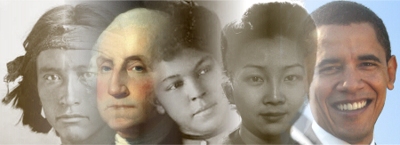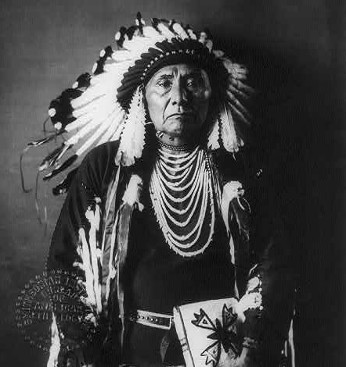Hin-mah-too-yah-lat-kekt (Thunder-Rolling-Down-the-Mountain), better known as Chief Joseph (1840-1904), was the leader of the Nez
Percé. He is most famous for the speech he gave at the time of his final surrender to U.S. troops in 1877 after a 1500 mile retreat with 700 other Nez Perce.
Tell General Howard I know his heart. What he told me before, I have it in my heart. I am tired of fighting. Our Chiefs are killed; Looking Glass is dead, Ta Hool Hool Shute is dead. The old men are all dead. It is the young men who say yes or no. He who led on the young men is dead. It is cold, and we have no blankets; the little children are freezing to death. My people, some of them, have run away to the hills, and have no blankets, no food. No one knows where they are - perhaps freezing to death. I want to have time to look for my children, and see how many of them I can find. Maybe I shall find them among the dead. Hear me, my Chiefs! I am tired; my heart is sick and sad. From where the sun now stands I will fight no more forever.
Chief Joseph remained an eloquent spokesman for his people. In 1879 he gave the following speech during a visit to Washington D.C.
At last I was granted permission to come to Washington and bring my friend Yellow Bull and our interpreter with me. I am glad I came. I have shaken hands with a good many friends, but there are some things I want to know which no one seems able to explain....
I am tired of talk that comes to nothing. It makes my heart sick when I remember all the good words and all the broken promises. There has been too much talking by men who had no right to talk. Too many misinterpretations have been made; too many misunderstandings have come up between the white men and the Indians. If the white man wants to live in peace with the Indian he can live in peace. There need be no trouble. Treat all men alike. Give them the same laws. Give them all an even chance to live and grow. All men were made by the same Great Spirit Chief. They are all brothers. The earth is the mother of all people, and all people should have equal rights upon it. You might as well expect all rivers to run backward as that any man who was born a free man should be contented penned up and denied liberty to go where he pleases. If you tie a horse to a stake, do you expect he will grow fat? If you pen an Indian up on a small spot of earth and compel him to stay there, he will not be contented nor will he grow and prosper. I have asked some of the Great White Chiefs where they get their authority to say to the Indian that he shall stay in one place, while he sees white men going where they please. They cannot tell me.
...
When I think of our condition, my heart is heavy. I see men of my own race treated as outlaws and driven from country to country, or shot down like animals.
I know that my race must change. We cannot hold our own with the white men as we are. We only ask an even chance to live as other men live. We ask to be recognized as men. We ask that the same law shall work alike on all men. If an Indian breaks the law, punish him by the law. If a white man breaks the law, punish him also.
Let me be a free man, free to travel, free to stop, free to work, free to trade where I choose, free to choose my own teachers, free to follow the religion of my fathers, free to talk, think and act for myself -- and I will obey every law or submit to the penalty.
Whenever the white man treats the Indian as they treat each other then we shall have no more wars. We shall be all alike -- brothers of one father and mother, with one sky above us and one country around us and one government for all. Then the Great Spirit Chief who rules above will smile upon this land and send rain to wash out the bloody spots made by brothers' hands upon the face of the earth. For this time the Indian race is waiting and praying. I hope no more groans of wounded men and women will ever go to the ear of the Great Spirit Chief above, and that all people may be one people.
Hin-mah-too-yah-lat-kekht has spoken for his people.
From:
Chief Joseph: The Biography of a Great Indian
Chester Anders Fee
Wilson-Erickson, 1936
Return to Speeches

